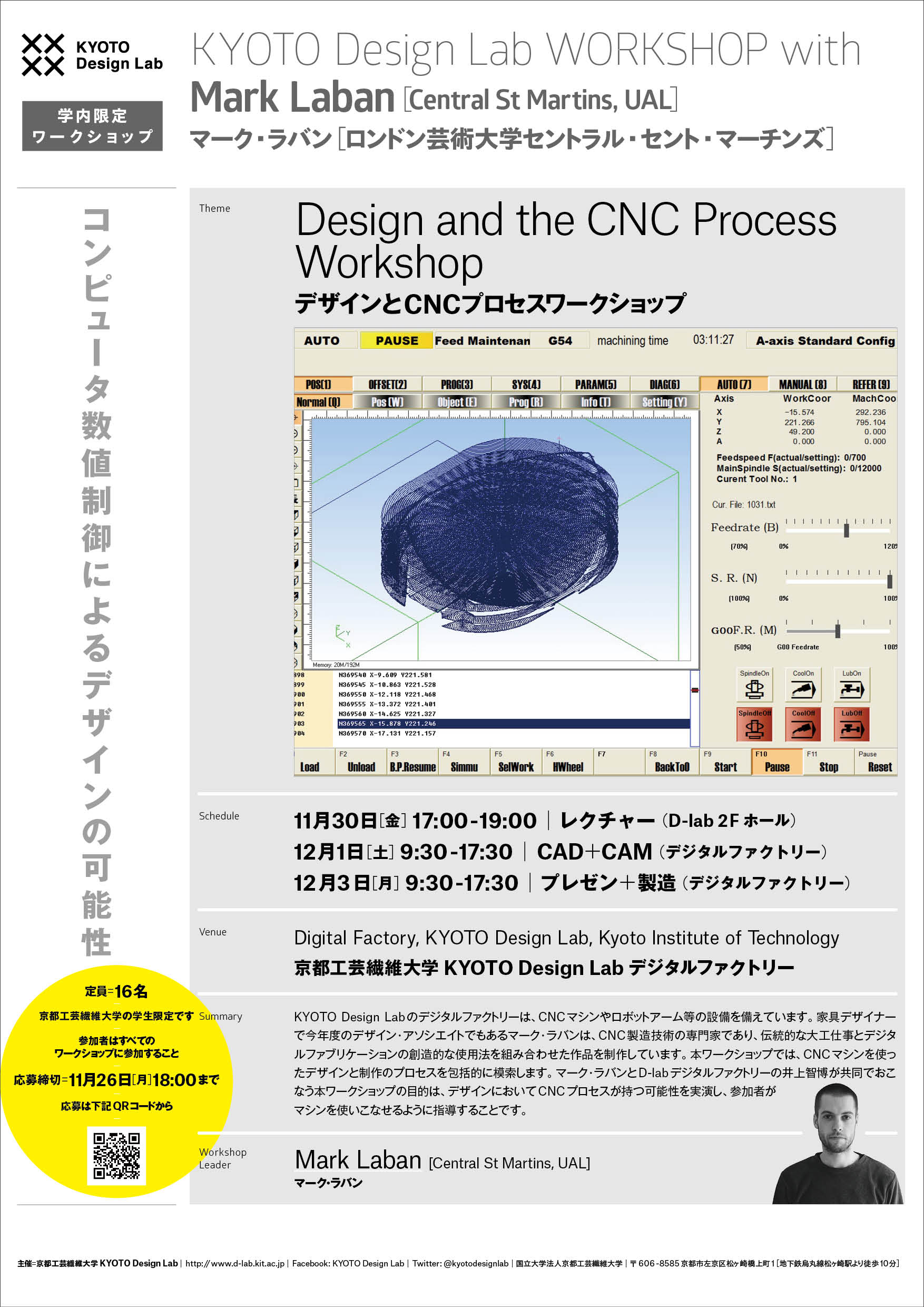KYOTO Design Lab[D-lab]は、家具デザイナーで2018年度デザイン・アソシエイトのマーク・ラバンによる「デザインとCNCプロセスワークショップ」を開催します。
京都工芸繊維大学の学生限定のワークショップです。ぜひご参加ください。

日程|2018年11月30日[金]、12月1日[土]、3日[月]
会場|京都工芸繊維大学 KYOTO Design Lab
定員|16名
参加条件|京都工芸繊維大学の学生であること、ワークショップの全ての日程に参加できること
講師|マーク・ラバン、井上智博(D-lab デジタルファクトリー)、ジュリア・カセム特任教授
概要|
KYOTO Design Labのデジタルファクトリーは、CNCマシンやロボットアーム等の設備を備えています。家具デザイナーで今年度のデザイン・アソシエイトでもあるマーク・ラバンは、CNC製造技術の専門家であり、伝統的な大工仕事とデジタルファブリケーションの創造的な使用法を組み合わせた作品を制作しています。本ワークショップでは、CNCマシンを使ったデザインと制作のプロセスを包括的に模索します。
目的|
マーク・ラバンとD-labデジタルファクトリーの井上智博が共同でおこなう本ワークショップの目的は、デザインにおいてCNCプロセスが持つ可能性を実演し、参加者がマシンを使いこなせるように指導することです。
講師
Mark Laban [Central St Martins, UAL]
マーク・ラバン
2016年にセントラル・セント・マーチンズにて家具デザインの修士号を取得。現在はオーダーメイド家具の注文を受注する家具デザイナーとしてとしてロンドンで活動している。最近の作品はロンドンのAram Galleryにて展示されている。Rustic Stool 1.0が2017年のWood AwardsにてStudent Prizeを受賞。
プログラム
11月30日[金] 17:00-19:00
レクチャー
D-lab 2F ホール
–
デジタル製造技術、特にCNCマシンのデザインと製造における応用に焦点を当てたレクチャーです。デザインの文脈におけるCNCマシンの典型的な使われ方や、創造的な使用法を模索しているデザイナーについて紹介します。
MODELA MDX 40、KitMill MOC900、Moth Math CNC 6090などのCNCマシンの紹介に始まり、ケミカルウッド、木材、ポリスチレンなどの素材についての講義、そしてワークショップの内容全体についての説明をおこないます。参加者同士でペアを作り、下記のプロジェクト概要に取り組んでください。
–
改造しハックすることで形態と機能と意味を再解釈しアップデートしたいと思える、伝統的または手作業で作られたオブジェクトをひとつ選んでください。
12月1日[土] 9:30-17:30
CAD+CAM
KYOTO Design Labデジタルファクトリー
–
CAD – 簡単なデモンストレーションの後に、ペアを組んでアナログ(計測)及びデジタル(3Dスキャニング)な方法を使って物理的なオブジェクトをデジタルフォーマットに変換します。オブジェクトをできるだけ正確にデジタイズした後、CADで実験的に様々なデザインイテレーションを作ります。
–
CAM – デザインにおけるCAMソフトウェアのステージについて説明しデモンストレーションします。技術的側面がいかにデザインと製造における意思決定に影響するかを学びます。その後、CAMステージのデザインを練習します。
–
宿題|デザインイテレーションを通して3Dのオブジェクトの編集作業を引き続き行い、一番良くできたものを根拠の説明と一緒に最終日にプレゼンしてください。
12月3日[月] 9:30-17:30
プレゼンテーション + ファブリケーション
KYOTO Design Labデジタルファクトリー
–
最終的なデザインの3DモデルとCAMシミュレーションと元々のオブジェクトをペアで発表します。ワークショップリーダーや他の参加者が下記の基準に従ってデザインを分析及び評価します。
–
モデリング|3Dモデルの正確さ
デザイン|どれほど効果的且つ想像力に富んだやり方でデザイン概要を実現しているか
効率|オブジェクトの製造にかかる時間、素材の使用量、廃棄素材の量
適切さ|CNCの機能のアイデアへの活かし方、製造方法としてCNCプロセスが最も適切かどうか
–
評価が高ったいくつかの作品を実際にCNCマシンを使って製造します。プロセスの最終ステージにおける実践的な体験ができます。
応募締切|11月26日[月]18:00まで
応募方法|下記の応募フォームより必要事項を記入のうえ、ご応募ください。
KYOTO Design Lab [D-lab] will hold the workshop “DESIGN and the CNC Process WORKSHOP” by Mark Laban, KYOTO Design Lab 2018 Design Associate.

Schedule: Friday 30 November, Saturday 1 and Monday 3 December, 2018
Venue: KYOTO Design Lab, Kyoto Institute of Technology
Maximum participants: 16
Qualification requirements: Only students of Kyoto Institute of Technology. Attendance is compulsory for the full workshop.
Leader(s): Mark Laban + Tomohiro Inoue (D-lab Digital Factory) + Professor Julia Cassim
Description:
D-lab’s Digital Factory is home to several CNC machines as well as a brand new robot arm. Furniture designer and 2018-19 Design Associate Mark Laban specializes in the use of CNC manufacturing, combining traditional carpentry techniques with the creative use of digital fabrication. The workshop will comprehensively explore the processes involved in designing and making with CNC machines.
Aims:
The aim of this workshop run jointly by Mark and D-Lab’s Tomohiro Inoue is to demonstrate possibilities for design within CNC process and to bring participants technically up to speed in its use.
Lecturer
Mark Laban [Central St Martins, UAL]
Mark Laban holds a BA in Fine Art and graduated from Central Saint Martins, University of the Arts London in 2016 with an MA in Design specialising in furniture. His practice is based in London where he works as a furniture designer and maker undertaking bespoke commissions. Mark’s recent work has been exhibited in London’s Aram Gallery, and his ‘Rustic Stool 1.0’ was selected as winner of the Wood Awards student/graduate designer category in 2017.
Programme
Friday 30 November | 17:00-19:00
Lecture
D-lab HQ 2F
–
A lecture introducing digital fabrication techniques, focusing on CNC machine tools and their application in design and manufacturing. The talk will discuss the conventional use of this technology within a design context as well as how some designers explore these processes in creative ways.
Participants will be briefed on the relevant CNC machines (MODELA MDX 40, KitMill MOC900, Moth Math, CNC 6090) and materials (Chemiwood, Wood, Polystyrene) that they will be concerned with, along with an overview of the workshop contents and structure. Working in pairs participants will be asked to address the following brief:
–
Bring in a traditional or handcrafted physical object that you would like to modify, hack or transform in order to update, reinterpret or reinvent its form, function and meaning.
Saturday 1 December | 09:30-17:30
CAD + CAM
D-lab Digital Factory
–
CAD – After a brief demonstration and working in their pairs, participants must transfer their chosen physical object(s) into digital format with the use of analogue (measuring) or digital (3D scanning) techniques. Once they have digitized their objects as accurately as possible they will proceed to experiment with the form in CAD, generating a number of design iterations.
–
CAM – The CAM software stage of the process will then be explained and demonstrated, revealing how the technical aspects of this stage can directly relate to or impact decisions in the design and manufacturing process. Participants will then practice and integrate the CAM stage into their design.
–
Homework: Participants should continue to manipulate and develop their 3D object through design iterations, choosing the most successful outcome to present with a brief rationale in the final session.
Monday 3 December | 09:30-17:30
Presentations + fabrication
D-lab Digital Factory
–
In their pairs, participants will present their 3D modelled designs and CAM simulations alongside their original objects. The designs will be analyzed by the workshop leaders and the participants as a group against the following criteria:
–
Modelling: How technically correct and accurate is the 3D model?
Design: How effectively and imaginatively does the outcome meet the design brief?
Efficiency: How long does the object take to produce? Material usage and wastage?
Suitability: Does the idea match with the capabilities of the machine? Is CNC process the most applicable technique for fabricating this design?
–
Two or three of the most interesting and successful designs will then be selected to manufacture using the appropriate CNC machines and materials, with participants able to have a hands on experience in the final stage of the process.
Application deadline: 18:00 Monday 26 November, 2018
Application form: Please fill in the bellow form and send it.